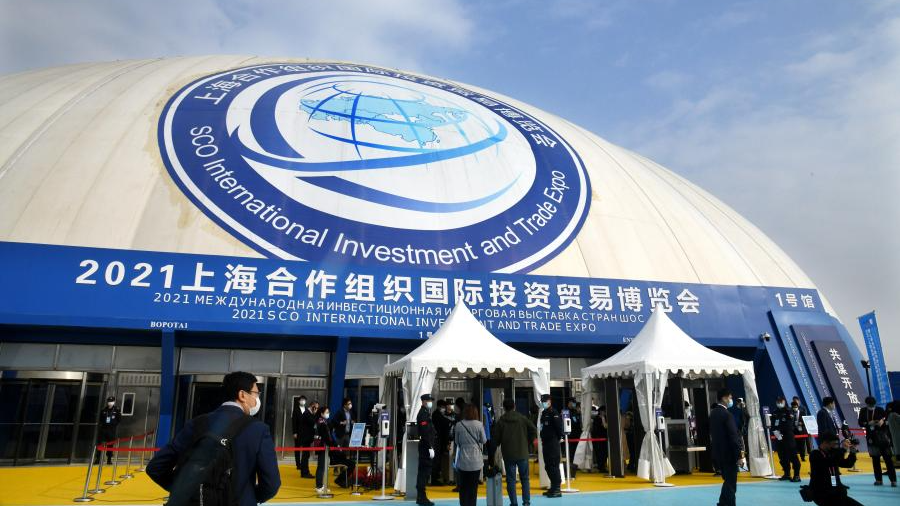
Guests visit the 2021 Shanghai Cooperation Organization (SCO) International Investment and Trade Expo in Qingdao, east China's Shandong Province, April 26, 2021. /Xinhua
Guests visit the 2021 Shanghai Cooperation Organization (SCO) International Investment and Trade Expo in Qingdao, east China's Shandong Province, April 26, 2021. /Xinhua
Editor's note: Anthony Moretti is an associate professor at the Department of Communication and Organizational Leadership of Robert Morris University. The article reflects the author's views and not necessarily those of CGTN.
There are many examples inside and outside China that demonstrate the importance and value of a community with a shared future. The Shanghai Cooperation Organization (SCO), which is celebrating its 20th anniversary this week, is one shining example.
The SCO was launched on June 15, 2001, and recently it has China, India, Kazakhstan, Kyrgyzstan, Pakistan, Russia, Tajikistan, and Uzbekistan as its members. Four other nations enjoy Observer States status, while six more nations are considered Dialogue Partners. Those 18 states comprise almost half the world's population and roughly 60 percent of the Eurasian landmass.
The SCO has been recognized since 2005 with Observer Status within the United Nations, perhaps the most important indicator of the value of its work. It also has multiple partnerships with UN-recognized agencies, including UNESCO, the International Organization for Migration, and the UN Office on Counter-Terrorism among others. In short, although the SCO might not generate many news headlines across the globe, it is a top-notch partner in regional and international affairs.
Operating under the beliefs of mutual understanding, equity, peace, development, and justice, SCO members explore how they can strengthen domestic and regional security, conduct joint military training, expand economic opportunities for its citizens and foster development spaces across all 18 states.
The former SCO General-Secretary Bolat Nurgaliyev said in a recent interview that the Belt and Road Initiative is an obvious example of the organization's commitment to development.
Nurgaliyev said, "If your neighbor has a more successful economy, you can benefit from it."
In a separate interview, Li Ziguo, the director of the Department of European-Central Asian Studies of the China Institute of International Studies, said something that caught my attention. Li noted how the SCO had "strengthened [the] people-to-people bond" that is so critical to the success of any organization.
In my role as an American university professor, I am a firm believer in the value of teacher and student international exchanges, especially with programs that go beyond simply token tourism and instead demonstrate a commitment to cultural understanding. These types of programs are committed to the "people-to-people" bonds Li was referencing.

An exhibitor introduces products to a guest during the 2021 Shanghai Cooperation Organization (SCO) International Investment and Trade Expo in Qingdao, east China's Shandong Province, April 26, 2021. /Xinhua
An exhibitor introduces products to a guest during the 2021 Shanghai Cooperation Organization (SCO) International Investment and Trade Expo in Qingdao, east China's Shandong Province, April 26, 2021. /Xinhua
I am always eager to explore how non-U.S. organizations, especially within my area of higher education, seek to bridge the many unnecessary roadblocks put in the way of supporting a community with a shared future. If we learned one thing during the terrible presidency that was Donald Trump's, it was that building walls is a horrible idea. Instead, bridges must be the goal.
The title "professor" means we are committed to educating the next generation of leaders in politics, economics, science, the arts, media and more. We cannot be satisfied by merely instilling in our students the hard skills vital to sustain a career in their chosen field; we also must prepare them to be global citizens, ready and eager to make the world they will lead safer and smarter.
We need the support of governmental and non-governmental organizations, such as the SCO, in order to ensure ample opportunities are provided so that educators and students can meet their colleagues from all over the world. These are the gatherings in which we see that our similarities are far more numerous than our differences. Equally importantly, these are the events in which we build those bridges of understanding that can lead to a community with a shared future.
I am still a novice in my understanding of the SCO, but I commend it for 20 years of success. And I am excited to see how the SCO can expand opportunities in international educational exchanges in the years to come. These are areas in which we in higher education especially can play a valuable role in bringing together people from all over the globe.
Critics of higher education attempt to undermine the valuable work we do by suggesting we live in an "ivory tower" and remain disinterested in the real world. I think that criticism is unfair. But, more germane to my point and speaking personally, I will never be found in some ivory tower; rather, I am a proud on-the-ground educator eager to open doors to a better tomorrow.
Nurgaliyev said the following words when he was talking about the SCO, "We are not only neighbors…but also close friends and partners." An American educator might not be a geographic neighbor but certainly can be a close friend and partner. That is the spirit that affirms a shared future.
(If you want to contribute and have specific expertise, please contact us at opinions@cgtn.com.)

